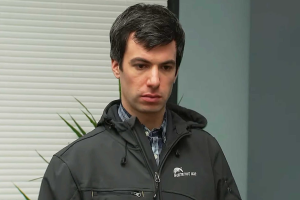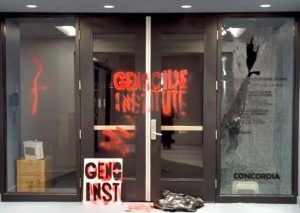Concordia University and its student union have been served a formal legal letter demanding that threats of violence, harassment of Jewish students and antisemitic graffiti be stopped immediately.
The letter was filed on behalf of ‘Student 1’ by Montreal lawyer Neil Oberman with the firm Spiegel Sohmer. It was sent to Concordia University President Graham Carr, Concordia Student Union (CSU), Solidarity for Palestinian Human Rights Concordia (SPHR), and Bara Iyad Abuhamed.
“Student 1 is exposed to aggression, bullying, threats of violence and antisemitism on campus,” the letter reads.
The letter alleges that since the start of the Israel Hamas war on Oct. 7, 2023 which “amplified” antisemitism on campus there have been threats of violence against Jewish students, antisemitic graffiti, group harassment of Jewish students, professors promoting hate speech, and a student union that is supporting anti-Jewish rhetoric. Students are unable to wear Stars of David or other religious objects for fear of violence.
Earlier this week, the campus group StartUp Nation set up a table at the university to commemorate 100 days since the taking of the hostages in Israel. Students were notified by Andrew Woodall, dean of students, not to attend for safety concerns, although there were no reported incidents.
In November, one student was arrested and three people were slightly injured after pro-Palestinian students confronted Jewish students at a booth at the university.
Additionally, the letter accuses Concordia of failing to investigate antisemitic and hate-motivated incidents on campus and not providing teachers and staff with tools to moderate and control situations to ensure a serene learning environment. The university has not adequately dealt with campus groups that promote antisemitic discourse and support movements such as the Boycott, Divestment and Sanctions (BDS). The school is also accused of failing to enforce some of its own policies such as wearing a mask to conceal one’s identity.
“They have to establish proper security protocols in order to protect all students on campus,” Oberman told The CJN. “This means enforcing their own rules and regulations governing their student body.”
“People are very brave when they believe that covering their faces in a riot or an interaction of violence will shield them from repercussions,” he said. “That’s why our client wants this particular regulation strictly enforced.”
The student union is accused of supporting campus groups that promote antisemitism on campus such as Solidarity for Palestinian Human Rights. The letter references a social media post by SPHR a day after the Hamas massacre, calling it a “heroic attack” and asking students to march in solidarity with Palestine.
Bara Iyad Abuhamed, a part-time student at Concordia since 2016, is accused of threatening Student 1 and creating an “atmosphere of hate and intolerance” on and off campus.
“The allegation of our client is that he is not a student,” said Oberman in a press conference. “He’s on campus in order to agitate. To bring groups from the outside in order to interfere with good students who want to go to school, who want to learn, who want to be good parts of their community.”
Two photos included in the legal letter show Abuhamed on campus with an Israeli flag in the background shouting and off campus being apprehended by Montreal police. A string of problematic tweets from Abuhamed’s X account from 2014 were also included in the letter.
Oberman says the university president is prioritizing the school’s reputation rather than ensuring the well-being of students.
Concordia University is being asked to create an action plan that will dismantle the SPHR, and remove antisemitism on campus to restore a proper learning environment.
The letter also requires the university remove funding from the CSU until any ‘hate’ is removed from the student union as well as prevent Abuhamed from enrolling in future courses and removing him from the campus.
“The reality is these asks are the requirements in order to give (Student 1) the proper environment to continue studying,” Oberman told The CJN.
Oberman said the initial letter was sent to Concordia on Jan. 12 and the university had not responded which has prompted the law firm to send a follow up letter on Jan. 17. Concordia has until Jan. 25 to reply before the client pursues legal action.
A representative from Concordia’s president’s office said they could not comment on the specifics of the letters since they are pending legal proceedings.
“However, please note more generally that Concordia has clearly condemned antisemitism and any kind of violence or intimidation. The university has also taken several measures on campus to ensure our community’s safety, including increased monitoring of events and demonstrations as well as adding supplemental personnel when appropriate, meetings with student groups, and the creation of a committee with expertise in mediation and conflict resolution,” the president’s office said in an email to The CJN.
Any member of the university experiencing racism, including antisemitism, can make a complaint under Concordia’s Code of Rights and Responsibilities, the university noted.
“Complaints and the processes under the Code of Rights are confidential but we can confirm that the University is acting on complaints made following recent events. Since November 8, we have also increased workshops on anti-discrimination for our community and launched an active listening initiative to help community members address distressing events. We are now finalizing an anti-hate campaign that will be launched shortly and that will first focus on antisemitism.”
In November, two Jewish students and one faculty member filed a $15-million class action lawsuit against Concordia University, alleging a lack of effort to combat campus antisemitism over the past two decades.
Earlier this week, Oberman sent a legal letter to Montreal Mayor Valerie Plante charging the city has failed to give police forces adequate resources to address hate rallies.







